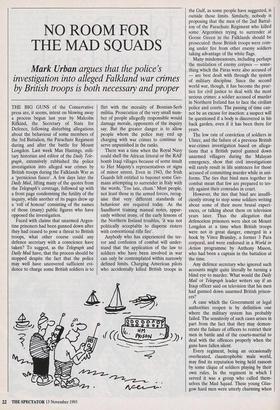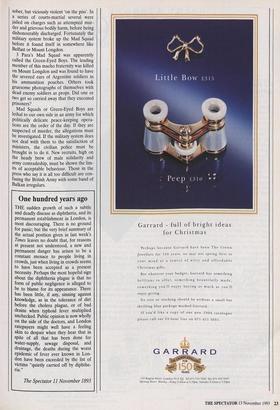NO ROOM FOR THE MAD SQUADS
Mark Urban argues that the police's
investigation into alleged Falkland war crimes by British troops is both necessary and proper
THE BIG GUNS of the Conservative press are, it seems, intent on blowing away a process begun last year by Malcolm Rifkind, the Secretary of State for Defence, following disturbing allegations about the behaviour of some members of the 3rd Battalion, the Parachute Regiment during and after the battle for Mount Longdon. Last week Max Hastings, mili- tary historian and editor of the Daily Tele- graph, extensively rubbished the police investigation into alleged war crimes by British troops during the Falklands War as a 'pernicious fiasco'. A few days later the Daily Mail, lifting many of the quotes from the Telegraph's coverage, followed up with a front page condemning the futility of the inquiry, while another of its pages drew up a 'roll of honour' consisting of the names of those (many) public figures who have opposed the investigation.
Faced with claims that unarmed Argen- tine prisoners had been gunned down after they had ceased to pose a threat to British troops, what other course could any defence secretary with a conscience have taken? To suggest, as the Telegraph and Daily Mail have, that the process should be stopped despite the fact that the police may well have uncovered sufficient evi- dence to charge some British soldiers is to flirt with the morality of Bosnian-Serb militia. Prosecution of the very small num- ber of people allegedly responsible would damage morale, opponents of the inquiry say. But the greater danger is to allow people whom the police may end up charging with war crimes to continue to serve unpunished in the ranks.
There was a time when the Royal Navy could shell the African littoral or the RAF bomb Iraqi villages because of some insult to Her Majesty's representatives or signs of minor unrest. Even in 1943, the Irish Guards felt entitled to bayonet some Ger- mans attempting to surrender in Italy with the words, 'Too late, chum.' Most people, not least those in the armed forces, recog- nise that very different standards of behaviour are required today. As the Sandhurst training manual notes, appar- ently without irony, of the early lessons of the Northern Ireland troubles, 'it was not politically acceptable to disperse rioters with conventional rifle fire'.
Anybody who has experienced the ter- ror and confusion of combat will under- stand that the application of the law to soldiers who have been involved in war can only be contemplated within narrowly defined limits. Charging American pilots who accidentally killed British troops in the Gulf, as some people have suggested, is outside those limits. Similarly, nobody is proposing that the men of the 2nd Battal- ion of the Parachute Regiment who killed some Argentines trying to surrender at Goose Green in the Falklands should be prosecuted: those British troops were com- ing under fire from other enemy soldiers taking advantage of the white flags.
Many misdemeanours, including perhaps the mutilation of enemy corpses — some- thing which the Paras were also accused of — are best dealt with through the system of military discipline. Since the second world war, though, it has become the prac- tice for civil justice to deal with the most serious crimes: a soldier accused of murder in Northern Ireland has to face the civilian police and courts. The passing of time can- not be an excuse for inaction: a suspect will be questioned if a body is discovered in his back garden, even if it has been there for years.
The low rate of conviction of soldiers in Ulster, and the failure of a previous British war-crimes investigation based on allega- tions that a British patrol gunned down unarmed villagers during the Malayan emergency, show that civil investigations will rarely result in life sentences for those accused of committing murder while in uni- forms. The ties that bind men together in combat mean that few are prepared to tes- tify against their comrades in court.
However, the ties that bind are insuffi- ciently strong to stop some soldiers writing about some of their more brutal experi- ences, or talking about them on television years later. Thus the allegation that defenceless prisoners were shot on Mount Longdon at a time when British troops were not in great danger, emerged in a book by Vince Bramley,. a former 3 Para corporal, and were endorsed in a World in Action programme by Anthony Mason, who had been a captain in the battalion at the time.
Any defence secretary who ignored such accounts might quite literally be turning a blind eye to murder. What would the Daily Mail or Telegraph leader writers say if an Iraqi officer said on television that his men had gunned down unarmed British prison- ers?
A case which the Government or legal authorities reopen is by definition one where the military system has probably failed. The sensitivity of such cases arises in part from the fact that they may demon- strate the failure of officers to restrict their men in battle and of the courts-martial to deal with the offences properly when the guns have fallen silent.
Every regiment, being an occasionally overheated, claustrophobic male world, may find its reputation being held ransom by some clique of soldiers playing by their own rules. In the regiment in which I served it was a group who called them- selves the Mad Squad. These young Glas- gow hard men were utterly charming when sober, but viciously violent 'on the piss'. In a series of courts-martial several were Jaded on charges such as attempted mur- der and grievous bodily harm, before being dishonourably discharged. Fortunately the military system broke up the Mad Squad before it found itself in somewhere like Belfast or Mount Longdon.
3 Para's Mad Squad was apparently called the Green-Eyed Boys. The leading " member of this macho fraternity was killed on Mount Longdon and was found to have the severed ears of Argentine soldiers in his ammunition pouches. Others took gruesome photographs of themselves with dead enemy soldiers as props. Did one or two get so carried away that they executed prisoners?
Mad Squads or Green-Eyed Boys are lethal to our own side in an army for which Politically delicate peace-keeping opera- tions are the order of the day. If they are suspected of murder, the allegations must be investigated. If the military system does not deal with them to the satisfaction of ministers, the civilian police must be brought in to do it. New recruits, high on the heady brew of male solidarity and army comradeship, must be shown the lim- its of acceptable behaviour. Those in the Press who say it is all too difficult are con- fusing the British Army with some band of Balkan irregulars.



























































 Previous page
Previous page